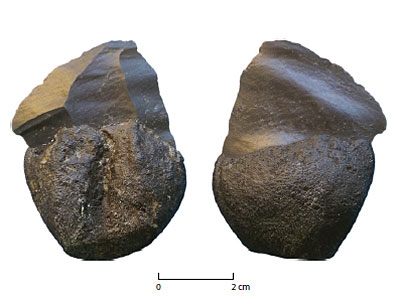Fire came to Europe later than was thought
Early hominins probably lived in Europe for hundreds of thousands of years before using fire to alleviate the winter cold, to cook or to make tools. It was only in the period betwen 300,000 and 400,000 years ago that the first finds were made that indicate that people had the ability to control fire.
This is the conclusion of Leiden archaeologist Wil Roebroeks and his American colleague Paola Villa in an article that appeared on 15 March on the website of the Proceedings of the National Academies of Sciences (PNAS).
Cold winters without fire
The researchers have cast doubt on the accepted hypothesis that the colonisation of Europe with its cold winters could only have been possible if man was able to apply the use of fire. Yet, it now appears that it was possible to survive cold European winters for hundreds of thousands of years without fire.

Neanderthal flint with glue made from birch bark, more than 200,000 years ago. Found in Italy. Photo: P. P. A. Mazza.
Africa: natural fire
Some researchers such as Harvard primatologist Richard Wrangham believe that hominins used fire more than one and a half million years ago for such purposes as cooking. This would give them a better diet, a bigger brain and more social contacts. In short: evolutionary advantage. This does not apply for Europe, that has been inhabited for roughly a million years, nor to Asia. The researchers do seem to be right about Africa. In other words: as long as they no longer claim that there were numerous naturally occurring fires in these warm areas. But there is nothing to indicate that humans produced and used fire, according to Roebroeks.
Neanderthals were ingenious
Another of Roebroeks and Villa's conclusions is that Neanderthals who inhabited Europe from between 500,000/400,000 to 35,000 years ago were ingenious in their ability to use fire. This contradicts another widely accepted hypothesis, namely that Neanderthals were too primitive for this; only modern man, who came to Europe from Africa some 50,000 years ago are supposed to have been capable of such a feat.
Roebroeks, himself a Neanderthal expert, says: ‘Their ability to use fire to make a kind of glue from from birch bark was highly ingenious. We know they were using this glue more than 200,000 years ago to set stone tools in wood because we have found the remains of glue on flint artefacts.'
The archaeologists have analysed the available archaeological material to create a database of 141 places where fire may have been used in Europe between 1.2 million and 35,000 years ago.
